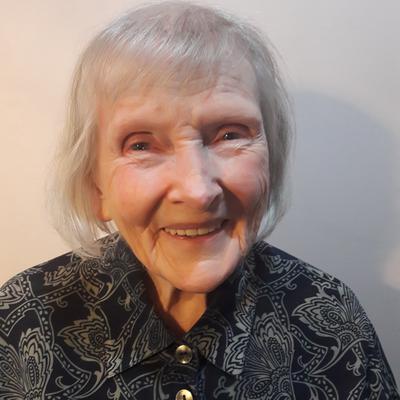Ina Hearns finds great joy and satisfaction doing Family History work despite the frustrations and sadness associated with trying to decipher old handwriting and reading death records for infants and young children. Ina Hearns is quick to remind others that “you might not exist without your ancestors.”
Sitting quietly at her computer, Ina “Paddy” (Butler) Hearns has grown to love genealogy in all its different forms.
.JPG)
Born in October 1923 in Pretoria, Transvaal, South Africa, she has indexed over 30,00 records and has arbitrated over 40,000 more.
When asked what her goal is for family history she admits that it’s simply, “Get as much done as possible.”
In 1953, after opening the door to very hot and thirsty missionaries, she received the messages the missionaries brought and joined The Church of Jesus Christ of Latter-day Saints. She later discovered that she was the first member to join in Nkana/Kitwe, South Africa.

In 1964 Ina and her husband, Winston, after enduring many government upheaval and frightening incidents, decided to leave Zambia and emigrate to New Zealand, where Ina’s brother and widowed father had already settled. Owing to many other homes also being vacated by the exodus of non-Africans, as they left they sold their home for less than 30% of its real value.
After Ina joined The Church of Jesus Christ of Latter-day Saints she became interested in genealogy. She quickly began collecting names and information of her close relatives. Ina’s husband, Winston, joined the Church in 1965.
When the mining equipment company where Winston was employed shut down, he refused to “go on the dole”, resulting in the family returning to South Africa for him to become a mine manager near Naboomspruit, 132 miles from Johannesburg.
Many holidays were spent traveling mostly to the Cape and Transvaal Provinces, researching sources for ancestral data. This included visiting churches, cemeteries, museums, libraries and newspaper offices. She also traveled to genealogy departments at Rhodes University in Grahamstown, the Cape, and Witwatersrand University in Johannesburg. Continued research was performed at Union Buildings and genealogy and history societies in Pretoria.
Copies of ancestral wills back to the 1500’s were received from England, in Latin and old English, which Ina was able to translate because she had learned Latin as a student..
.jpg)
After more unrest in South African rule was predicted, the Hearns once again returned to New Zealand, settling in Christchurch, where their eldest daughter and her husband had obtained employment.
As members of the Church’s Christchurch Stake (a group of congregations), their Church leader asked them to inaugurate and establish family history programmes in their area. They accepted the challenge and were soon teaching others.
Ina is meticulous in her work and makes certain she has obtained authentic sources for her records.
In 1988 Ina and Winston moved to Hamilton where they were able to work in the Hamilton Family History Library. They also assisted with the “Universal Data Entry” programme, while continuing research for their own ancestors.
After becoming a widow in 2001, Ina moved to Auckland to be closer to her relatives. In spite of losing her companion she continued her family history efforts. In January 2007 she became an indexing project volunteer and has worked at that ever since. (Indexing is transcribing information from a document into a digital format.)
She first indexed 22 batches of United States census enumerations.
.JPG)
When asked what types of records are her favourites, she says, “I have no preference, but complete transcriptions of birth, marriage and death records are the most important.”
In response to the question “Why do you do indexing?” she replied, “I want to support the Church’s request for volunteers. It also means helping others to gain information in their own family history research.
Being able to transcribe a large number of African records has proved difficult but rewarding.” Ina has not yet indexed any slave information but is planning to do so, as she has always felt compassion for them and their struggles.
On a typical day, after completing her usual chores, Ina begins with arbitration, (Arbitration is the process of experienced indexers checking indexed information to ensure its accuracy), then family history research. .)
She has found that if she starts with family history there is usually not enough time left for arbitrating in the three to eight hours she devotes daily to this work. But she intends to continue working at her computer -- quietly serving.